This page contains affiliate links. We may earn a small commission if you make a purchase, at no extra cost to you.
When you start a blog, you will have to master the complicated and confusing world of SEO to be successful.
The internet is full of conflicting opinions but one thing that remains steady is keyword research and keyword monitoring.
As a travel blogger, I’m targeting keywords in the travel niche. It would be nice if I could simply write about my travel experiences.
But without targeting specific keywords it is very hard to be found in search engines and be successful as a blogger. The competition is simply too high!
Once you have found good keywords to target you have to make sure they perform over time. That is where keyword monitoring comes in.
I will show you step-by-step how I do keyword monitoring, why it’s important and which free and paid tools there are to use to get started.
What is Keyword Monitoring?
If you are this deep into SEO, you will understand what keywords are. You will need to research target keywords with your blog to drive traffic to it.
So what is the difference between keyword monitoring and keyword research?
Keyword Research: Is the process of finding and discovering keywords with high volume and low competition that you will be able to compete with on your blog. They should also be relevant to the niche you target on your blog.
Keyword Monitoring: Is tracking how those keywords you found during your research perform over time. You will need to monitor how your keywords perform in rankings, how search trends change and adjust your content strategy according to the changes.
Most bloggers are well aware of the need to do keyword research. But where most fail is continuing to monitor keywords, myself included!
So let’s find out all the reasons why keyword monitoring is so important for bloggers.
Why should Bloggers be doing Keyword Monitoring?
Drawing from my own blogging experience and industry research, I’ve identified 5 essential reasons why monitoring keywords can help you achieve success (or maintain it) with your blog and keyword strategy.
1. Improves Rankings in Search Engines
Keyword Monitoring is important to maintain your position in Google search rankings. Most bloggers, including me, usually complete their keyword research, write the article, and forget about it.
The problem with this is that certain keywords may perform poorly over time. This may be due to changes in the Google algorithm or search trends.
Either way keyword monitoring is the best way to keep an eye on any changes and ensure that you keep a high ranking in search engine results.
For example, when I see that keywords are gaining or losing more than 5 positions I will look into it and try to identify the cause for it, such as:
- Seasonality
- Trends
- Algorithm update
- Shift in search intent
- Outranking by competitors
- AI overviews
- Appearance of new widgets
Depending on the cause, I can react quickly and make adjustments to the post before dropping more positions. Or in the case of a ranking gain, apply the same principles to other articles.
Keyword monitoring helps me to stay on top of the game and collect data and insights in the ever-evolving SEO and search landscape.
2. Optimizes Longtail Keywords
One of the keys to writing comprehensive content is researching longtail keywords because they often reflect a user’s search intent better than short keywords.
An example of a longtail keyword we have written about and are ranking for is “how to eat healthy and cheap while traveling” versus the shorttail keywords “healthy travel food” or “cheap travel meals”.
If you fully answer longtail keywords your content is more likely to be comprehensive and shown in snippets or AI overviews.
Longtail keywords often have lower search volume but will usually have lower competition. This makes them great targets if you are a new blogger and you will have a higher chance of ranking.
By using keyword monitoring you can easily track longtail keywords that are trending and use them to create comprehensive content that is likely to rank high.
3. Maximizes Money Making Opportunities
Keyword monitoring is also crucial to maximize the amount of money you can make from your blog.
One of the key money-making opportunities for bloggers is affiliate marketing. However, the commission you make from different affiliates can vary drastically.
So if you want to maximize the money from your site you need to target profitable keywords.
Monitoring keywords related to affiliate programs offering a good payout is a good way to maximize the income from your blog.
For example, you run a technology blog and notice that searches for cameras and laptops are trending. But you know that the payouts for camera affiliates are more profitable. Then you can focus on content related to cameras to maximise your money-making opportunities.
4. Tracks Industry Trends
As a blogger tracking trends within your industry is vital if you want to create content that resonates with your audience.
Keyword monitoring is one of the best ways for bloggers to do so. By tracking trending keywords you can stay ahead of the herd and create content before it becomes too saturated.
Whether you are a food, travel or technology blogger, trends change quickly and if you do not stay on top of them you will be left behind. Blogging, at least in my case, is a full-time job!
For example, when SafetyWing launched their new travel insurance app which makes claims super easy, we immediately wrote about it and secured a spot on page 1 of Google.
5. Helps with Content Planning and Organization
Keyword monitoring can also help you in planning your content calendar. If you monitor keywords you can see what keywords are popular at certain times of year and plan content according to trends.
For example, if you have a travel blog you may notice articles about the “best place to spend Christmas in Mexico” become popular in November and December.
Then you can wait until just before December to publish content related to Christmas in Mexico. This maximizes the number of readers of your content and will drive the most traffic to your blog.
Now that you know all the reasons why keyword monitoring is important for bloggers, let’s go through the best tools out there to monitor keywords for your website.
New to blogging? Free tools every blogger needs 🧑💻
How to Monitor Keywords?
Below I will show you step-by-step how I monitor keywords for free using the Semrush position tracking tool.
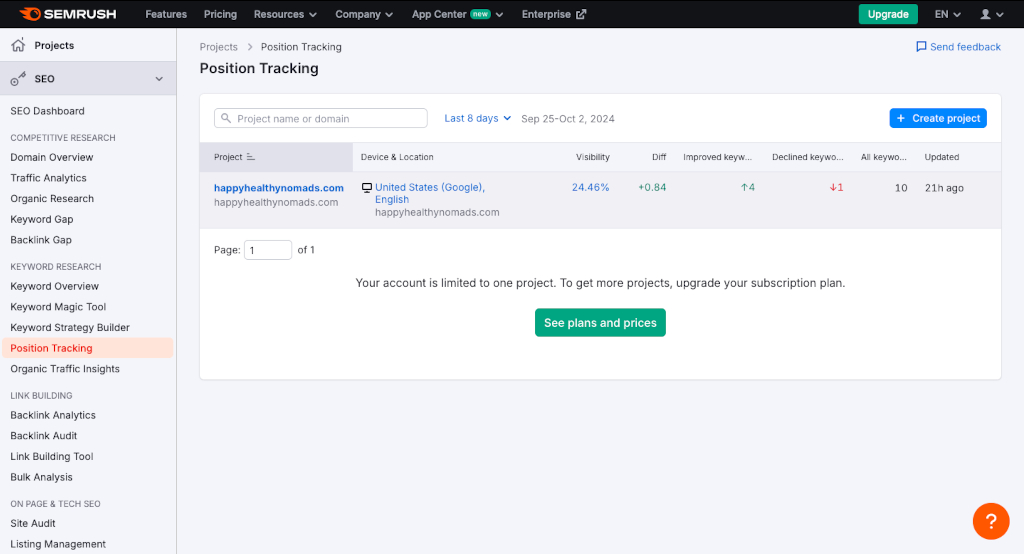
The first thing you need to do is to click on the position tracking tab on the left-hand side of Semrush’s website, highlighted in red in the image above.
Under this tab, you can create a project to track keywords. Semrush’s free plan will allow you to set up one project (which is your website) and to track a limited number of keywords for it.
Click on the blue button “Create project” and enter the URL of your website. Then pick a country that you want to track. I chose the United States because that’s where most of our traffic comes from.
This is an important step because you need to know where your target market is. If most of your audience is from the United States but you live in Australia, you need to pick the United States because that is where your traffic will come from.
You can easily check this in your Google Search Console or Google Analytics.
Next, you need to choose the keywords that you want to track, for example, “free things to do in Medellin“. After this is done you can add the keywords to your project and select start tracking.
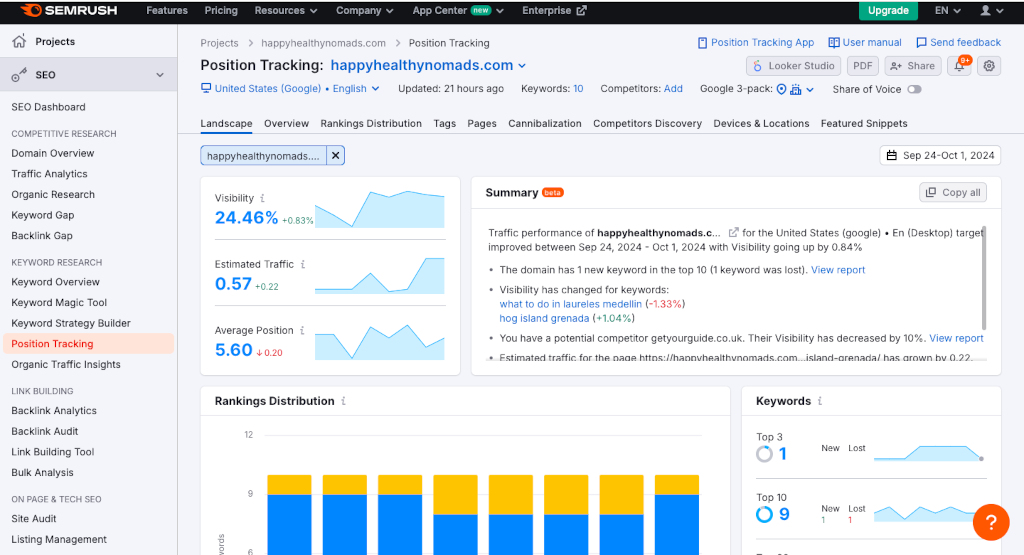
The first page you will see is the position tracking page. This allows you to see metrics such as how much organic traffic your site is receiving.
This page is good for getting an overview of how your site is performing in search engines.
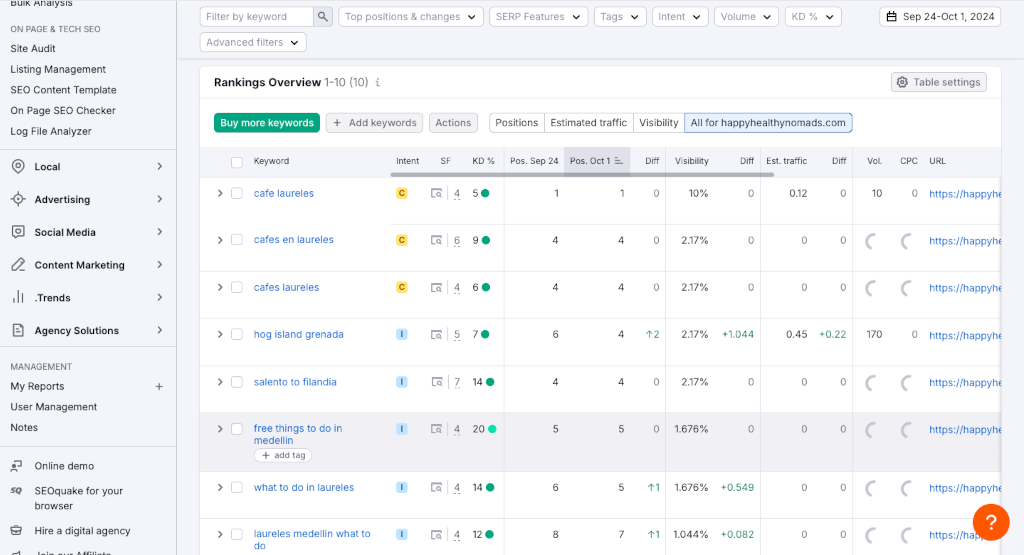
To get a closer look at the keywords you are tacking click on the overview tab. Under this tab, you can see the keywords you are ranking for and their changes in position over time.
With this table, you can see what keywords are performing better or worse on your site. You can then use this information to make changes to your blog posts so that they appear higher in search engine results.
This might sound a bit technical, but when you try it yourself you will see how easy it is to navigate. Within a few clicks, you get a clear overview of how your blog is doing when it comes to keyword performance.
If you’d like to see the Semrush keyword positioning tool in action, check out this 3-minute short tutorial below.
Now that we know how to monitor keywords, let’s take a look at which keyword tool is right for you, as there are quite a few out there.
How to Choose the Right Keyword Monitoring Tool?
When it comes to choosing a keyword tracking tool, there is no one-size-fits-all. Choosing the right tool for you will depend on:
- How many keywords you want to track
- The size of your blog
- Your budget
- If you are a beginner or advanced blogger
- If you are new to SEO or deep into it
- If you’re looking for a tool that focuses primarily on keywords or is an all-in-one SEO solution
But don’t worry I will guide you in your decision-making process based on my personal experiences and what each keyword tool has to offer.
Best Keyword Monitoring Tools for Bloggers
Over the years I have tried 6 keyword monitoring tools that are worth checking out. Most of them offer a free trial or allow you to track a limited number of keywords for free!
1. Semrush (Best Keyword Tracking Tool for Advanced Bloggers)

If you are serious about Keyword Monitoring, one of the best tools for rank tracking you can use is Semrush. They are well-known to anyone involved with SEO and a keyword powerhouse.
That’s why Semrush is not the cheapest option. But if your budget allows they will offer the most comprehensive tools for effective keyword monitoring on your site. Plus so much more!
All their services are aimed at helping businesses optimize their online presence.
That’s why their core features include SEO tools such as keyword research & monitoring, on-page SEO, competitor analysis, rank tracking, backlink monitoring and site audit.
Not to mention a bunch of AI marketing tools and voice search SEO which both hold lots of potential for new and advanced bloggers.
Pricing per month:
– Pro 139.95 USD for 500 keywords
– Guru 249.95 USD for 1,500 keywords
– Enterprise 5,000 USD for 5,000 keywords
– 7-Day Free Trial available
– Create a free account
2. Keysearch (Best Keyword Monitoring Tool for New Bloggers)
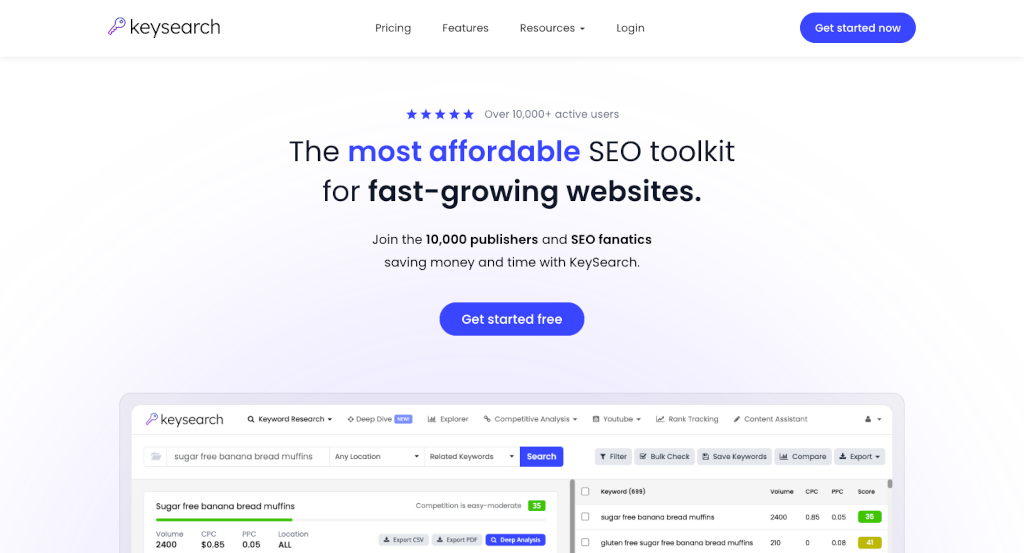
If you have a lower budget or are just starting, then one of the best keyword monitoring tools for bloggers is Keysearch.
The top selling point of Keysearch is the price. The Starter Plan is only 24 USD per month which is quite easily the cheapest tool out there.
But you can only track 80 keywords per month. While with the Pro Plan you can track 200 keywords a month.
For most beginner bloggers this will be enough keywords to track. But if your blog expands you may want to be able to track more keywords with a tool such as Semrush.
Pricing per month:
– Starter 24 USD for 80 keywords
– Pro 48 USD for 200 keywords
– Limited free trial available
– Create a free account
3. Ahrefs

Ahrefs is another very well-known and popular tool for SEO. For bloggers serious about SEO, Ahrefs has a range of powerful keyword-tracking features.
However, is not the best option for bloggers who are just starting. This is because many of the tools available will take a while to understand for a beginner.
But if you have a large blog with a lot of traffic and want to level up your SEO game, Ahrefs is a good option for setting up keyword monitoring reports.
Pricing per month:
– Lite 129 USD for 750 keywords
– Standard 249 USD for 2,000 keywords
– Advanced 449 USD for 5,000 keywords
– No free trial
– Get a paid account here
4. MozPro
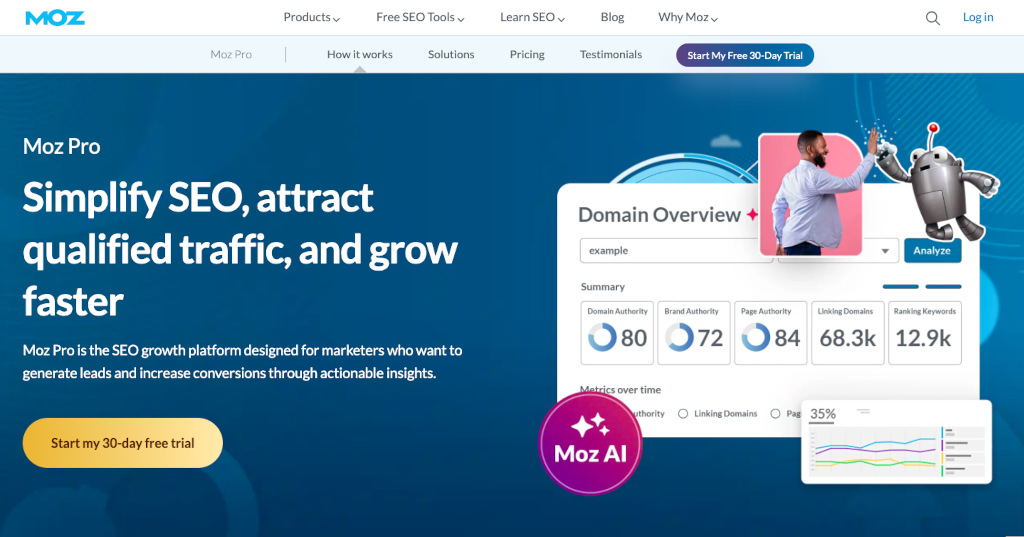
Moz is a company many bloggers know because of their free Moz Bar. It allows you to see the Page and Domain Authority of a website (including your own) while you browse the internet.
I have used the Moz Bar since day 1 of my blogging career! It is a super useful free tool that I highly recommend to any blogger.
But what many people don’t realize is that you can also do keyword monitoring with Moz. The Moz Pro plans start at 49 USD a month and will allow you to track 50+ keywords per month.
Pricing per month:
– Starter 49 USD for 50 keywords
– Standard 99 USD for 300 keywords
– Medium 179 USD for 1,500 keywords
– Large 299 USD for 3,000 keywords
– Get their 30-Day Free Trial
5. SE Rankings
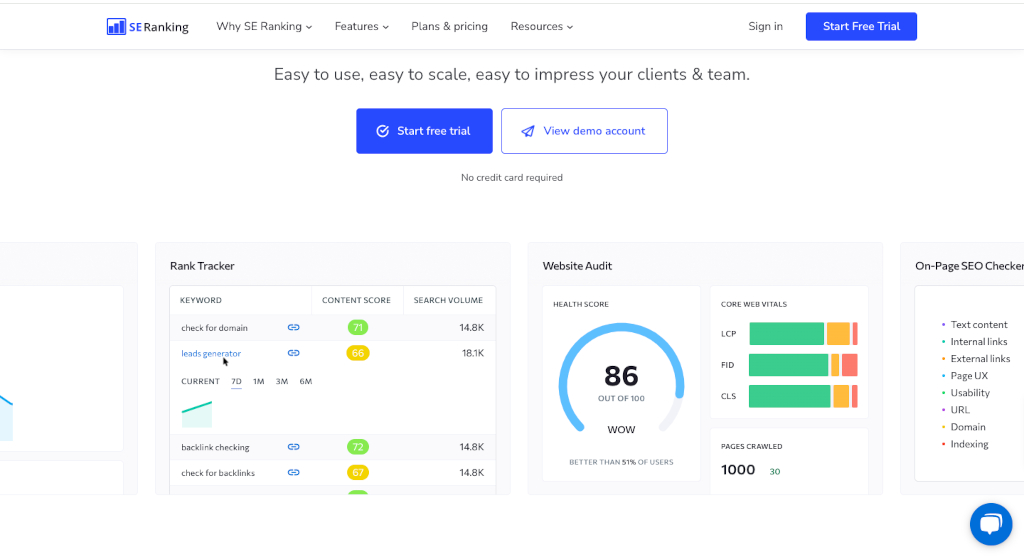
SE Rankings is another SEO tool that is great for beginners to SEO. It lacks some of the more advanced tools that some users may require.
But if you are just starting out it has everything you need. A huge advantage of SE Rankings is the amount of keywords you can track for a fairly low price.
The Essential plan starts at 52 USD and allows you to track 500 keywords. This is more than enough for most bloggers, myself included.
So SE Rankings is a good option if you want to track a lot of keywords but not spend a lot of money.
Pricing per month:
– Essential 52 USD for 500 keywords
– Pro 95 USD for 2,000 keywords
– Business 207 USD for 5,000 keywords
– Get their 14-Day Free Trial
6. Mangools
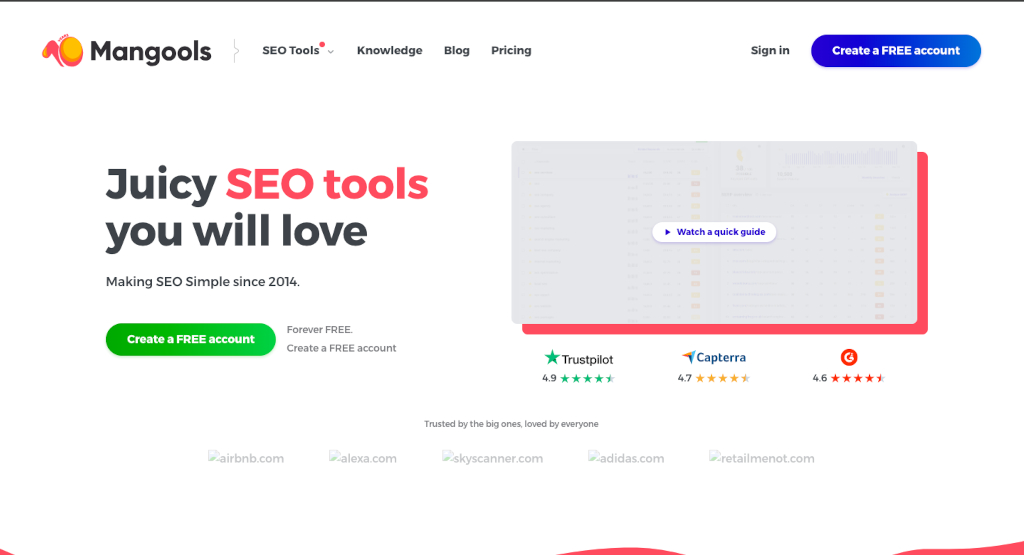
Mangools is another great keyword monitoring tool for beginner bloggers. It is simple and easy to use and the basic plan starts at 29.90 USD per month.
This plan gives you the ability to track 200 keywords which is more than enough when you start out.
Mangools is a bit newer to the scene but has good reviews. So it is another good option if you want a keyword monitoring tool that will not break the bank.
Pricing per month:
– Basic 29.90 USD for 200 keywords
– Premium 44.90 USD for 700 keywords
– Agency 89.90 USD for 1,500 keywords
– Limited free trial if you create an account
Keyword Monitoring Tools Comparison & Conclusion
As you can see, each tool offers different plans and packages with varying numbers of keywords you can monitor.
To make this comparison even easier, I’ve created a table summarizing all of them, based on the number of keywords you can track.
| MOZpro | keysearch | mangools | Semrush | SE rankings | ahrefs |
| Starter 49 USD for 50 keywords | Starter 24 USD for 80 keywords | Basic 29.90 USD for 200 keywords | Pro 139.95 USD for 500 keywords | Essential 52 USD for 500 keywords | Lite 129 USD for 750 keywords |
| Standard 99 USD for 300 keywords | Pro 48 USD for 200 keywords | Premium 44.90 USD for 700 keywords | Guru 249.95 USD for 1,500 keywords | Pro 95 USD for 2,000 keywords | Standard 249 USD for 2,000 keywords |
| Medium 179 USD for 1,500 keywords | Agency 89.90 USD for 1,500 keywords | Enterprise 5,000 USD for 5,000 keywords | Business 207 USD for 5,000 keywords | Advanced 449 USD for 5,000 keywords | |
| Large 299 USD for 3,000 keywords | |||||
| 30-Day Free Trial | Limited free trial | Limited Free Trial | 7-Day Free Trial | 14-Day Free Trial | No free trial |
If you are a blogging beginner, I recommend looking into MozPro, Keysearch and Mangools which let you track 50-200 keywords for a fairly small monthly price.
SE Rankings offers the best value for money, which lets you track 500 keywords for 52 USD.
Out of those four, my personal favorite is Keysearch, which I have used for years. It’s the cheapest keyword tool on the market and I find it the easiest to navigate from the gecko.
Keysearch lacks advanced features (hence the entry-level price) but it is a solid tool for bloggers who are mainly looking to do keyword research and some keyword monitoring.
If you are an advanced blogger or looking for an all-in-one SEO platform, then check out Semrush and Ahrefs. They come with a higher price tag but give you so much more than keyword research and monitoring.
Especially Semrush is an online marketing powerhouse and will cover all your SEO needs from A-Z. Even with a free account, you’ll get limited access to keyword monitoring, competitor analysis, on-page SEO, site audits and more. So I highly recommend giving it a try.
Plus, take advantage of all the free trials to save money and see which tool you like the most!
BLOGGER ESSENTIALS
These are sites we use and recommend for starting a blog. Check out our Resources for all tips!
💻 Build your blog for free on WordPress.org
🌎 Get affordable hosting & 24/7 support on Bluehost
🌟 Shop a professional & beautiful theme on 17th Avenue
💰 Earn money as a travel blogger with Travelpaypouts
🗝️ Find keywords and start ranking with Keysearch
📝 Automatically correct spelling mistakes with Grammarly
🎓 Learn all about blogging on-demand on Udemy
Now you know all about Keyword Monitoring for Bloggers!
I hope this overview has made the world of keyword monitoring clearer for you. There are so many aspects to SEO that it can easily feel overwhelming, especially if you are just starting.
But as long as you stick to it, over time it will start making sense and pave your road to success. Good luck on your SEO journey!
Feel free to leave a comment if you have any questions or say thanks with a virtual coffee if my walk-through has helped you out 🙌
Also, make sure to check out our other helpful resources for bloggers and digital nomads which I have linked below for you.
READ ALSO
- Best Travel Insurance for Digital Nomads
- Best Cities in Mexico for Digital Nomads
- 31 Tips to Extend Your Travels
- 5 Ways to Get Free Accommodation
SAVE THESE PINS FOR LATER
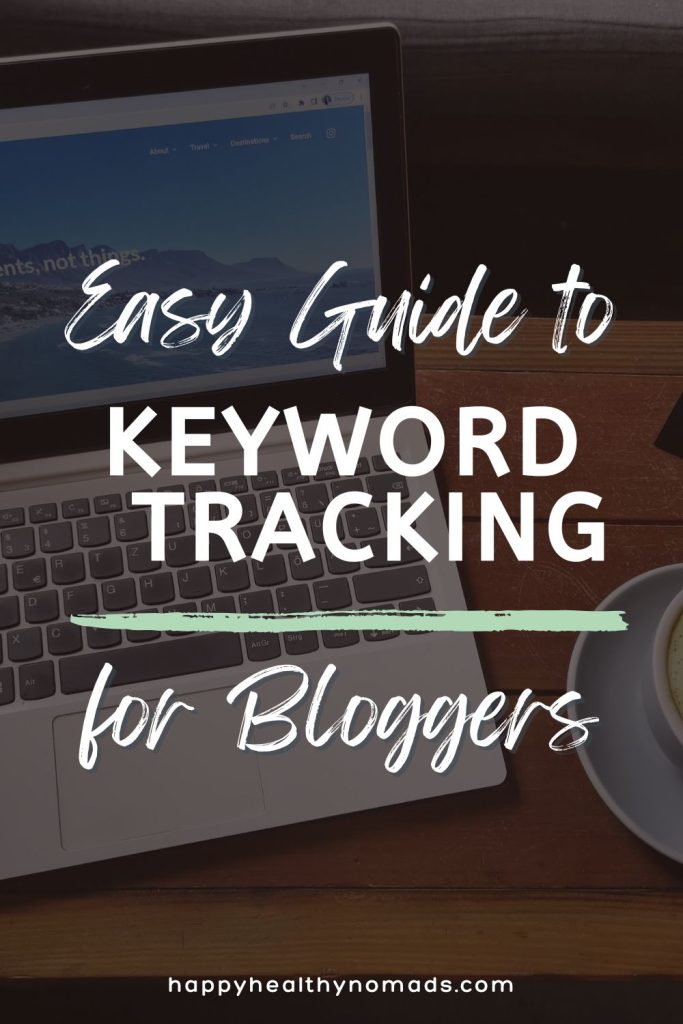




Leave a Reply